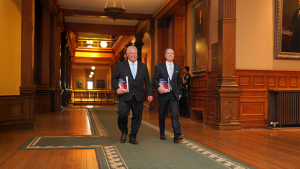While still struggling with the aftermath of a decade-long Islamic insurgency, oil-rich yet impoverished Algeria is getting a makeover: a new airport, its first mall, its largest prison, 60,000 new homes, two luxury hotels and the longest continuous highway in Africa.
ALGIERS, Algeria
While still struggling with the aftermath of a decade-long Islamic insurgency, oil-rich yet impoverished Algeria is getting a makeover: a new airport, its first mall, its largest prison, 60,000 new homes, two luxury hotels and the longest continuous highway in Africa.
The power behind this runaway building spree is China.
Some 50 Chinese firms, largely state-controlled, have been awarded US$20 billion in government construction contracts, or 10 per cent of the massive investment plan promised by President Abdelaziz Bouteflika for a country where jobs and housing are scarce and al-Qaida has struck roots.
Algiers, the tense and rundown capital, now has something relatively new to the Arab world: a Chinatown.
The Beijing government has been a supporter of Algeria since the 1960s, after it won independence from France, and today the 35,000 Chinese in the country are the biggest foreign population after the French.
Trade both ways soared to $4.5 billion last year, from just $200 million in 2001, according to Ling Jun, deputy head of the Chinese Embassy in Algiers. China, is now second only to France in exports to Algeria.
Algerian exports to China barely top $300 million because China is a latecomer to the North African country’s biggest asset, the oil and gas under its portion of the Sahara Desert, which is dominated by U.S. firms. “But we’re very active for the prospecting of new fields,” Ling said.
And meanwhile, they’re earning a hefty chunk of Algeria’s oil money.
The China State Construction Engineering Corp., is building two-thirds of Algeria’s 1,200 kilometre east-west highway at breakneck speed and was on the verge of completing it this month after just three years, Ling says.
The Algerian story mirrors China’s inroads elsewhere in Africa, which are helped not just by its bulging coffers but by the fact that unlike some Western countries, China doesn’t make human rights and corruption-free procedures a condition for investment.
Some feel the China’s African footprint has gotten too deep.
“Africa shouldn’t have eluded one form of neocolonialism to fall headfirst into Chinese neocolonialism,” Rene N’Guettia Kouassi, the head of the economic commission at the African Union, was quoted as saying in Jeune Afrique, the leading French-language weekly on the continent.
What some Algerians also object to is that there is little trickle-down from China’s investment in the country.
Chinese firms import everything from the largest cranes to refills for their water coolers.
On construction sites, even the unskilled workers pushing wheelbarrows are usually Chinese, not Algerian.
Ling, at the embassy, said state firms now have the obligation to hire and train two Algerian workers for each employee they bring from China.
But the few Algerian labourers working for Chinese contractors have begun complaining about their conditions. Some of those working on the new highway’s construction site went on strike in late September, demanding overtime pay.
Another image problem is a persistent rumour that some Chinese workers are convicted criminals who got a plea bargain for agreeing to work abroad.
Tang, a chief engineer at a site near Algiers where several hundred homes are being built, denied the rumour as “pure fantasy.” Giving only one name because his management had not authorized him to be interviewed, he said every Chinese wishing to work for a state firm must show a clean police record.
He said his site employs 40 Chinese and 10 Algerians.
“Frankly,” he said, “the Chinese work better, and longer hours, without complaining.”
Associated Press










Recent Comments
comments for this post are closed